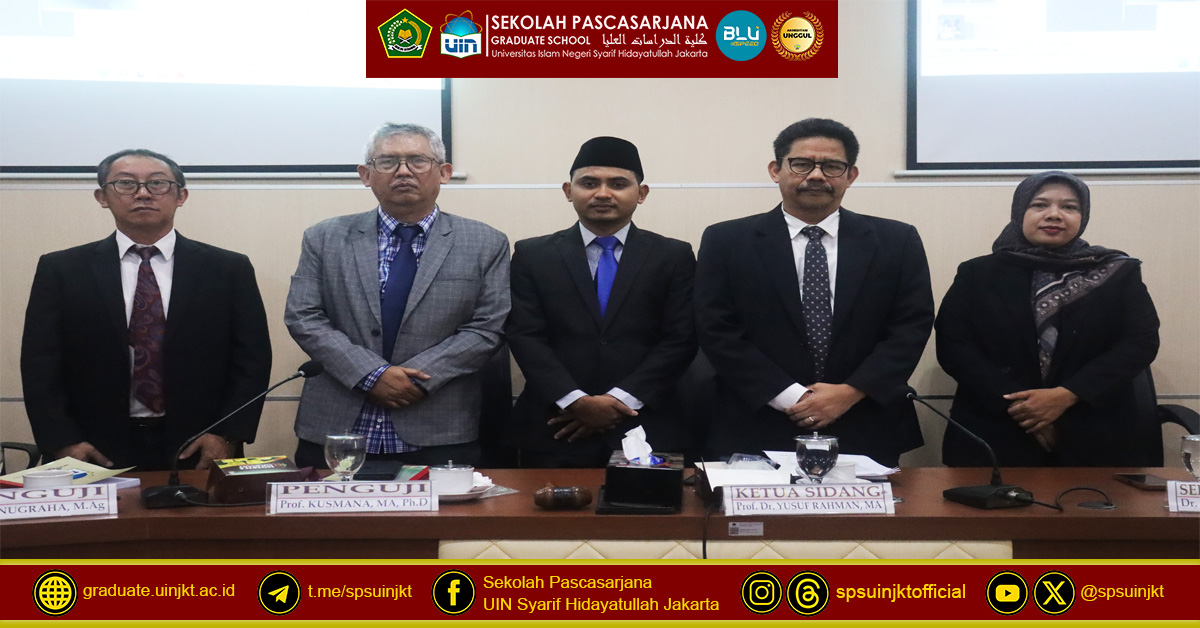Abdul Azim's Thesis Examination, The Concept of Tārīkhiyyah and Tanzīh of the Qur'an in the Modern Era: A Study of the Thought of Muḥammad Sālim Abū 'Āṣī
SPs Theater Room UIN Jakarta, SPs NEWS – The Graduate School of the Syarif Hidayatullah State Islamic University Jakarta held the 2788th Thesis Exam at the SPs Theater Room of UIN Jakarta, on Monday, November 24, 2025 with candidate Abdul Azim.
Abdul Azim is a student of the Master of Islamic Studies study program with a concentration in Tafsir. Abdul Azim wrote a thesis entitled "The Concept of Tārīkhiyyah and Tanzīh Al-Qur'an in the Modern Era: A Study of the Thought of Muḥammad Sālim Abū 'Āṣī".
Abdul Azim's thesis focuses on Muḥammad Sālim Abū 'Āṣī's criticism of the concept of tārīkhiyyah al-Qur'an (historicity of the Qur'an). This research fundamentally aims to uncover the ontological status of Qur'anic texts and how their interpretation responds to the ever-evolving dynamics of the times in the perspective of Muslim thinkers.
The qualitative method was used by Abdul Azim to dissect the views of Muḥammad Sālim Abū 'Āṣī, whom he considered to be the main critic in the heated discourse on the historicity and transcendent nature (tanzīh) of the Qur'an. This discussion confronts two poles of thought: those who see the Qur'an as a cultural product of historical nature, and those who see the sacred text as having an eternal and transcendent nature.
One of the figures who became a point of contrast was Naṣr Ḥāmid Abū Zayd. Abū Zayd is of the view that the Qur'an, in its essence and substance, is a product of culture, so it is historical and its interpretation must use a contextual method. This view places the text of the Qur'an in the framework of the social history of its revelation.
However, through library research, Abdul Azim found that Sālim Abū 'Āṣī had the opposite view. Abū 'Āṣī's thought represents a strict textualist approach to interpretation. For Abū 'Āṣī, the Qur'an is a manifestation of the qadīm nature of Allah's kalam (eternal), which inherently makes it transcendent.
The implication of this transcendent view is that the interpretation of the Qur'an must always be within the corridor of the text, resisting attempts to subject it to an excessive historical context. Abū 'Āṣī was concerned that the idea of tārīkhiyyah would reduce the Qur'an to a mere historical text that was relevant only in the Arab social context in which revelation was revealed.
Muḥammad Sālim Abū 'Āṣī's sharp criticism arose because he saw the tārīkhiyyah approach as an attempt to make the text subject to context. This, according to him, opens up space for modern ideologies to form meanings that should be absolutely sourced from God. Abū 'Āṣī was concerned with the manipulation of the text, in which the meaning of the verse was adjusted to ideological interests or currents of contemporary thought.
Azim's research also strengthens the argument that the concept of tārīkhiyyah of the Qur'an is considered by some commentators to potentially weaken the authority of the text and erode its transcendent role as a source of law. This is what prompted scholars, including Abū 'Āṣī, to vigorously question and criticize the discourse.
The most interesting and distinguishing part of Abdul Azim's findings is his conclusion regarding the motives of Abū 'Āṣī's criticism. In contrast to the previous findings (Nashifuddin Luthfi, 2022) that linked Abū 'Āṣī's criticism to the dominance of Western thought in Egypt, Azim concludes that the criticism arose because Abū 'Āṣī was concerned that the concept of tārīkhiyyah imposed on the Qur'an would lead to a condition in which "each age has its own religion." This is a stark warning against textual relativism.
Abdul Azim's thesis succeeded in presenting Muḥammad Sālim Abū 'Āṣī as a persistent defender of the tanzīh nature of the Qur'an, as well as making an important contribution in enriching and sharpening the discourse of the methodology of interpretation in the modern era. This research invites academics to re-reflect on the boundaries between transcendent texts and contextual interpretation.
Abdul Azim successfully defended his thesis under the guidance of Prof. Dr. Yusuf Rahman, MA, and was tested in front of a board of examiners consisting of Prof. Dr. Yusuf Rahman, MA, Prof. Kusmana, MA, Ph.D and Dr. Eva Nugraha, M.Ag.
After paying attention to the thesis writing, the comments of the examiner team and the candidate's answers, the examiner team determined that Abdul Azim successfully graduated with the title of Very Satisfactory. Abdul Azim is the 2788th Doctor in the field of Islamic Studies, in the master's program of the Graduate School of UIN Syarif Hidayatullah Jakarta. (JA)

